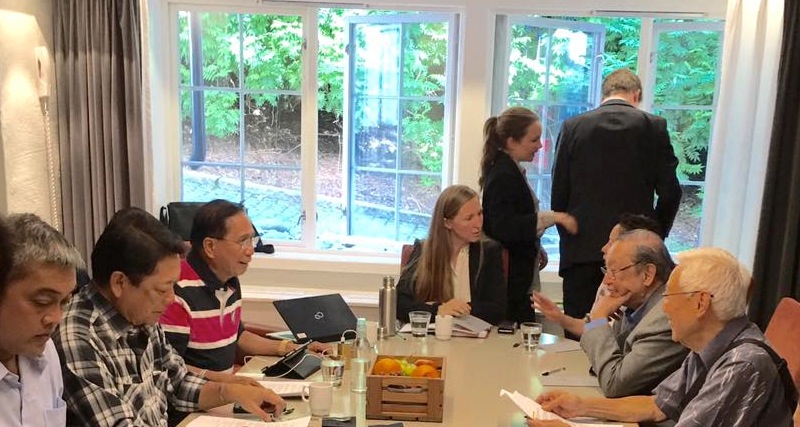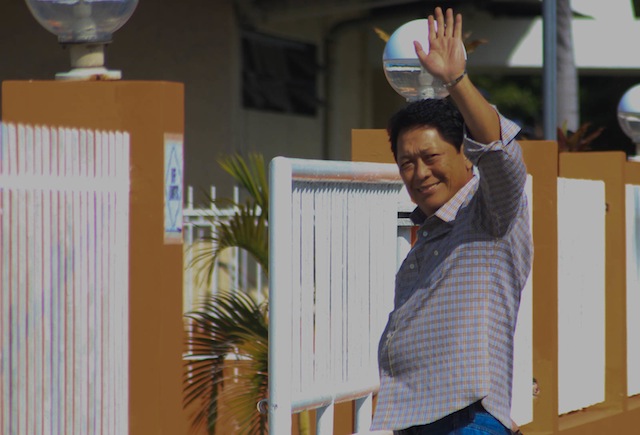The Duterte administration is eyeing the forging of a peace agreement with the National Democratic Front (NDF) “in nine to 12 months” because President-elect Rodrigo Duterte “wants peace in the country within the shortest period,” lawyer Silvestre Bello III, returning government peace panel chair, said.
The formal talks, according to the Joint Statement signed by representatives of the incoming administration and the NDF on June 15 was for the formal talks to begin in the third week of July in Oslo.

A two-page Joint Statement was issued at the end of the two-day talks between the delegation sent by President-elect Rodrigo Duterte (left) and the National Democratic Front (right) in Oslo, Norway on June 14 and 15. Photo from the Facebook account of returning Presidential Adviser on the Peace Process Jesus Dureza
Responding to a query on how long he expects the peace talks will take, Bello told Radyo ng Bayan Davao’s “Tayo’y Magtapatan” program on Monday that he and returning Presidential Adviser on the Peace Process Jesus Dureza and former Agrarian Reform Secretary Hernani Braganza – Duterte’s delegation to Oslo — talked about a time frame of “nine to 12 months.”
“Kayanin” (we will try our best), Bello told MindaNews.
Bello, also the incoming Labor Secretary, told the radio program that they are “always cautious” because Duterte has a self-imposed deadline of three to six months to stop the illegal drugs trade, corruption and criminality. He said the same timeline might be given to them so they have to be “ready for that eventuality, if the President will impose a timeline of three to six months for us to finish negotiations.”
Dureza told MindaNews that “the timeline is to be agreed upon” with the NDF but added, “yes, that’s attainable with working groups doing simultaneous work.”
In the same radio interview, Bello announced that he had proposed to Dureza that his panel will be composed of former members of the government (GPH) peace panel — Braganza, former Human Rights and Elections commissioner Rene Sarmiento, and Ateneo de Manila University School of Law Dean Sedfrey Candelaria.
He said he recommended the three because they had previously served in the peace panel and he would like to “make use of their institutional memory sa peace process.”
On the government side, Bello himself has the longest institutional memory of the GPH-NDF peace process, having been a member of the peace panel in the Ramos administration (1992 to 1998) and as chair of the GPH peace panel under the Arroyo administration from 2001 to 2004.
Bello also said Leoncio Evasco, Jr., Duterte’s national campaign manager and incoming Cabinet Secretary, recommended lawyer Angela Librado, a former city councilor and incumbent barangay captain of Matina, to the panel, representing women, and another lawyer from Cagayan de Oro to represent Indigenous Peoples (IPs).
Evasco told MindaNews he recommended lawyer Noel Felongco, an IP based from Cotabato City but now based in Cebu. Felongco is former Commissioner for Island groups and rest of Visayas at the National Commission on Indigenous Peoples (NCIP) and is Region 7 Chair of the Partido ng Demokratikong Pilipino (PDP-Laban), Duterte’s political party.
Bello said the names he mentioned persons will compose the GPH peace panel “upon approval of President Duterte.”
The panel’s proposed membership represents Luzon, Visayas and Mindanao, as well as IPs and women.
[

Laywer SIlvestre Bello III, Incoming Labor Secretary and government peace panel chair in the negotiations with the National Democratic Front, waves to reporters as he enters the “Malacanang of the South” in Panacan, Davao City on May 31, 2016. MindaNews photo by TOTO LOZANO
Bello attributed the success of the two-day talks in Oslo to the evident trust of the NDF in Duterte.
“Ito nagbigay sa amin ng breakthrough” (This gave us the breakthrough), he said, adding the NDF returned to the negotiating table because of Duterte.
He said the venue of the resumption of the peace talks will be in Oslo “out of respect for our foreign facilitator” but expressed hopes the next talks would be held in the Philippines.
Five-point agenda
The Joint Statement cited the five-point agenda for the July talks: the affirmation of previously signed agreements; accelerated process for negotiations, including the timeline for the completion of the remaining substantive agenda for the talks, socio-economic reforms, political and constitutional reforms, and end of hostilities and disposition of forces; reconstitution of the Joint Agreement on Safety and Immunity Guarantees (JASIG) list; Amnesty Proclamation for the release of all detained political prisoners, subject to concurrence by Congress; and mode of interim ceasefire.
The agreement also provides that the government panel under Duterte will recommend to the President the “immediate release of NDFP consultants and other JASIG-protected persons in accordance with the JASIG to enable them to participate in the peace negotiations;” and the “immediate release of prisoners/detainees based on humanitarian grounds.”
NDF peace panel chair Luis Jalandoni told DZMM on May 18 that there are currently 543 political prisoners, 88 of whom are sick and elderly. Out of the total, 18 are NDF peace consultants while three were sentenced to life imprisonment.
Ceasefire
Bello said the ceasefire is a major development in the peace process in that the NDF has not agreed to a ceasefire since the post-Marcos administration of Corazon Aquino in 1986 . “Never na pumayag na pag-usapan namin yung issue ng ceasefire. Ayaw nila yan (They never agreed to talk about a ceasefire. They don’t like that)…. But for the first time … after so many years pumayag sila na pag-usapan ang (they agreed to talk about) bilateral ceasefire.”
He said they will recommend to Duterte to declare a unilateral ceasefire upon the resumption of formal peace talks in July and hopes the NDF will also do the same.
The government and NDF actually signed in November 1968 an agreement for a 60-day ceasefire that would take effect on December 10 that year but the NDF issued a statement on February 18, 1987 declaring it “cannot see any justification for extending” the ceasefire, citing violations by the military. Both parties traded accusations of violations of the agreement.
Duterte, Bello said, “wants peace in the country within the shortest period at mukha namang parang nabighani si (NDF) chairman Luia Jalandoni at chief political consultant Joma (Sison) at ang kanilang mga miembro sa ating President. Mukhang di nila matanggihan si President Duterte (and it looks like NDF chair Luis Jalandoni, chief political consultant Joma and their members were charmed by the President. It looks like they could not refuse President Duterte).
Sison was Duterte’s professor in Political Thought at the Lyceum of the Philippines in Manila.
“Bridge of Hope”
In a statement on June 18, the Philippine Ecumenical Peace Platform (PEPP), which claims to be the largest ecumenical formation of church leaders in the country, said it is “elated over the fact that bridges are being built by both parties in order to have a just and enduring peace in our country.”
It described the Joint Statement the parties signed in Oslo as “a bridge of hope that principled negotiations may bear fruit and address the roots of the armed conflict.”
The Ecumenical Bishops Forum in a statement on June 20 that the ascent of Duterte “who had shown true friendship” with the Moro revolutionary fronts and the NDF “gives hope to the Bangsamoro and the Left that genuine peace based on justice is possible.”
It said it supports the effort of the incoming Duterte administration to forge peace with the Bangsamoro and the Left “and unify the whole Filipino people towards progress and peace.”
Dureza in a statement on June 16 said that after the two-day talks “there is now evident optimism and trust” and a “mutual enthusiasm and hope, not only amongst us negotiators across the table, but most significantly, among us all Filipinos , in whose behalf all these efforts are being done in the first place.”
“Yet, the road ahead to trek is not that always smooth and easy. There will expectedly be humps and bumps along the way. But there is a destination that we must all inevitably reach,” he wrote.
http://www.mindanews.com/peace-process/2016/06/21/duterte-administration-eyes-peace-pact-with-ndf-in-9-to-12-months/

No comments:
Post a Comment
Note: Only a member of this blog may post a comment.